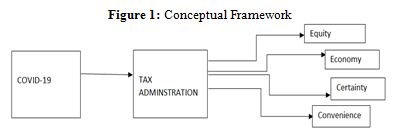A Study of the Effect of Covid-19 on Tax Administration in Zambia
DOI:
https://doi.org/10.5281/zenodo.10790355Keywords:
covid-19, tax administration, tax complianceAbstract
The objective of this study was to assess the effects of the Covid-19 pandemic on tax administration in Zambia. The study focused on the operations of Zambia Revenue Authority during the pandemic. The data collected consisted of tax statistics obtained from ZRA research and policy department. Descriptive statistics were used to analyze the data collected. The results showed that the Covid-19 pandemic had a devasting impact on revenue collections and tax compliance to some extent. The number of taxpayer registrations and returns filed reduced during the pandemic year. One positive impact that the pandemic had on tax administration is the increase of e-services adoption during the pandemic, the revenue authority recorded highest online user sign-ups during the pandemic in comparison to years prior and after the pandemic. The Covid-19 pandemic did gauge the authority’s level of resilience in response to national health crisis. Based on the findings and the conclusions drawn from this study, the research recommends that ZRA formulates strategies that will better handle such a crisis in the future. Strategies that the organization could formulate are ways of taxing the digital economy, the Covid-19 pandemic brought about new modes of doing business mostly through online platforms. Zambia Revenue Authority should therefore foster ways of collecting revenues generated through the digital economy.Downloads
References
Adam, S., & Miller, H. (2021). The economic arguments for and against a wealth tax. s.l.: John Wiley & Sons Ltd.
Alink, M., & Kommer, V. V. (2016). Handbook on tax administration. (2nd ed.). s.l.:IBFD.
Angelov, N., & Waldenström, D. (2021). The impact of covid-19 on economic activity: evidence from administrative tax registers. Germany: The IZA Institute of Labor Economics.
Commission on Taxation and Welfare Secretariat. (2021). Overview of economic principles and fundamentals of a tax system. s.l.: Commission on Taxation and Welfare Secretariat.
DiJohn, J. (2010). The political economy of taxation and state resilience in Zambia since 1990. s.l.: Crisis States Research Centre.
Dreisbach, T. (2019). Creating an electronic tax administration system in Zambia. s.l.: Global Delivery Initiative.
Ebeke, C., Mansour, M., & Graziosi, R. G. (2014). The power to tax in sub-saharan Africa: LTUs, VATs, and SARAs. s.l.: s.n.
Gupta, R. (2016). Filling the land tax void: New zealand. Ejournal of tax research, 14(3), 719-740.
Handema, M., & Haabazoka, L. (2020). The effect of capital structure management on commercial bank financial performance: A case of the Zambian banking sector. In: Popkova, E., Sergi, B. (eds) Scientific and Technical Revolution: Yesterday, Today and Tomorrow. ISC 2019. Lecture Notes in Networks and Systems, vol 129. Springer, Cham. https://doi.org/10.1007/978-3-030-47945-9_183.
Kabinga, M., Dr. Jörg, A. S. J., & Kiprotich, E. T. (2016). Principles of taxation. s.l.: Jesuit Centre for Theological Reflection.
Kloeden, D. (2011). Revenue administration reforms in anglophone Africa since the early 1990s. s.l.: International Monetary Fund.
Larina, L.B., Postnikova, D.D., Ageeva, O.A., & Haabazoka, L. (2021). The scientific and methodological approach to provision and evaluation of the digital economy’s global competitiveness. Popkova EG, Krivtsov A., Bogoviz AV The Institutional Foundations of the Digital Economy in the 21st Century. Berlin, Boston: De Gruyter, pp.173-182.
Mikhaleva, O. L., Pavlova, K., Charikov, V., & Aseev, D. (2018). Tax administration of vat: Impact of changes. SHS Web of Conferences, 62.
Moore, M., 2014. Revenue reform and state building in anglophone Africa. s.l.: ICTD.
Mpofu, F. Y., & Moloi, T. (2022). Direct digital services taxes in Africa and the canons of taxation. s.l.: s.n.
Mwanaumo, E.M., Chisumbe, S., Mbewe, N., Mambwe, M., & Haabazoka, L. (2020). Suitable infrastructure projects for public private partnerships in Zambia. In: Popkova, E.G., Sergi, B.S., Haabazoka, L., Ragulina, J.V. (eds) Supporting Inclusive Growth and Sustainable Development in Africa - Volume I. Palgrave Macmillan, Cham. https://doi.org/10.1007/978-3-030-41979-0_19.
Nalishebo, S., & Halwampa, A. (2014). Uncovering the unknown: An analysis of tax evasion in Zambia, Lusaka: Zambia Institute for Policy Analysis and Research.
Odd-Helge Fjeldstad - Chr. Michelsen Institute. (2007). Revenue authorities: Experiences from sub-saharan Africa. s.l.: SEAPREN Conference on Poverty Policies and Budgetary Processes.
P.M.R.C. (2020). Taxation in Zambia; Achievements and challenges, Lusaka, Zambia: Policy Monitoring and Reserch Centre.
Piper, J. (2014). Certainty in tax. s.l.: The Association of Chartered Certified Accountants.
Sekiraqa, A., Sekiraça, E., Sekiraqa, V., & Ahmeti, S. (2021). The impact of covid – 19 on collecting of tax revenues in Kosovo. s.l.: University of Prishtina.
United Nations Economic Commission for Africa. (2019). Tax administration in Africa. s.l.:UNECA.
Yamane, T. (1967). Statistics, an introductory analysis. (2nd ed.). New York: Harper and Row.
Z.R.A. (2023). Zambia revenue authority. [Online]. Available at: https://www.zra.org.zm/about-us/. [Accessed 11 February 2023].
Zambia Revenue Authority. (2020). Annual report. s.l.: Zambia Revenue Authority.

Downloads
Published
How to Cite
Issue
Section
License
Copyright (c) 2024 MWAPE ILUNGA

This work is licensed under a Creative Commons Attribution 4.0 International License.
Research Articles in 'Management Journal for Advanced Research' are Open Access articles published under the Creative Commons CC BY License Creative Commons Attribution 4.0 International License http://creativecommons.org/licenses/by/4.0/. This license allows you to share – copy and redistribute the material in any medium or format. Adapt – remix, transform, and build upon the material for any purpose, even commercially.









